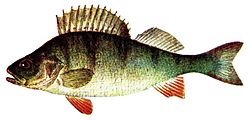asaris
Appearance
Latin
[edit]Noun
[edit]asarīs
Latvian
[edit]
Alternative forms
[edit]Etymology
[edit]FromProto-Balto-Slavic*ašerā,fromProto-Indo-European*h₂eḱereh₂,from*h₂eḱ-(“sharp, pointed, angular; stone”)(whence alsoass(“sharp”),q.v.), with a suffix-er(<*-rós), also found in other Indo-European words related to “sharpness” from other languages (compareLithuanianašrùs,Latinācer(“sharp”),Ancient Greekἄκρος(ákros,“at the edge; pointed, sharp”),ἄκρον(ákron,“corner; edge; blade”),Sanskritअश्रि(áśri,“corner, edge, blade”)). In Latvian, the vowel in the suffix (e) assimilated to the preceding stem vowel (a); in Slavic languages, the stem vowel assimilated to the suffix vowel. Cognates includeLithuanianešerỹs,dialectalašerỹs,Proto-Slavic*esera(Polishdialectaljesiora(“fish bone”)).[1]
Noun
[edit]asarism(2nd declension)
- Europeanperch(speciesoffish,Perca fluviatilis,withblackback,greenishsidesandabdomen,andreddishbelly)
- izmakšķerētasari―to fish, catch aperch
- jūrasasaris―redfish (lit. seaperch)
Declension
[edit]Declension ofasaris(2nd declension)
References
[edit]- ^Karulis, Konstantīns(1992) “asaris”,inLatviešu Etimoloģijas Vārdnīca[1](in Latvian), Rīga: AVOTS,→ISBN
Categories:
- Latvian etymologies from LEV
- Latin non-lemma forms
- Latin noun forms
- Latvian terms inherited from Proto-Balto-Slavic
- Latvian terms derived from Proto-Balto-Slavic
- Latvian terms inherited from Proto-Indo-European
- Latvian terms derived from Proto-Indo-European
- Latvian lemmas
- Latvian nouns
- Latvian masculine nouns
- Latvian terms with usage examples
- Latvian second declension nouns
- Latvian non-alternating second declension nouns
- lv:Fish

